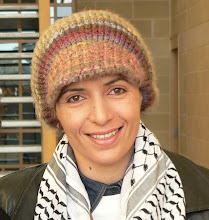Israel ’s deputy defense minister Matan Vilnai issued a terrifying threat early this month to Palestinians in Gaza . He spoke of a “shoah” enveloping Palestinians in Gaza .
Shortly after the Oslo agreement of 1993 when I harbored naïve hopes of an immediately realized peace, I studied Hebrew at an ulpan in Israel . My Hebrew has not thrived over the years, but whether Vilnai intended holocaust or cataclysmic catastrophe, he clearly meant real harm. Perhaps one day, 20 years hence, he will be charged for war crimes for the killing and maiming of Palestinian civilians his military carried out the very next day; his own words a powerful indictment. Until then, I live in fear for my family in Gaza ’s Khan Yunis refugee camp.
In the past three weeks I have taken both my children to Exeter hospitals for emergency treatment. This would probably be impossible today in Gaza with under-equipped hospitals being emptied to provide space for the flood of wounded. I have visited these hospitals in the past and witnessed medical personnel making the awful choice between which patient might be saved and which cannot due to the limited resources. My words, I confess, were of little comfort to those suffering their last moments.
Increasingly, I have wondered what value my words are to the international community. What more can I offer about the theft of my family land 60 years ago, our flight to Gaza , our subjugation here for 40 years under Israeli occupation and imprisonment, and my fervent but fleeting hope for a just peace? When Vilnai calls for a shoah and the newspapers translate it as a catastrophe as if that is acceptable treatment of Palestinians, what are we to think?
I am aware that political leaders in the West are apt to blame the Palestinian victims for their own plight. Perhaps if politicians refuse to comprehend, some of their constituents will listen in their stead. The African National Congress went around American presidents and to the American people to state their case. Ours, as Archbishop Desmond Tutu insisted, is not dissimilar and, indeed, might well be worse.
While Israeli colonizers left Gaza in 2005, Gazans remain imprisoned, unable to trade by sea or air or leave freely for Egypt or the West Bank . Nearly 70 percent of Gaza ’s 1.5 million people have homes and land elsewhere. The refugee camps in Gaza are not home. Home, what is rightfully ours, is now inside modern-day Israel .
When the American presidential candidates jockey for favor among Jewish and Christian voters who support an expansionist Israel they do so by relegating Palestinians to second-class status. Their insistence on Israel as a “Jewish state” ignores the reality that 20 percent of Israel ’s populace is actually Palestinian – imagine calling the United States a white, Christian state. Rhetoric regarding a Jewish state also suggests that my grandmother and mother, who were born on land seized for Israel , are somehow less human than Jews.
My grandmother has lived a long and difficult life, but she saw to it that her children and grandchildren became professionally successful. She is – at least in my mind – the equal of Jews around the world. She is no better, and she is no worse I grieve in her late years as she expresses fear that no proper burial casket will be available to her on account of the sanctions imposed upon us.
For years Hamas, a party for which I did not vote, has called for a long-term cease-fire with Israel . The rocket fire from Gaza , a desperate act of retaliation, would cease in order that the far deadlier Israeli attacks on Palestinians would also come to a halt. Israel has refused. Consequently, we have war and Palestinians in growing numbers are flocking to Hamas on account of its willingness to fight both siege and threats of a shoah.
In this climate, I hold little hope for the visit of Secretary of State Condoleezza Rice. Two years ago she supported continuing Israeli attacks on Lebanon even as most of the world urged an immediate cease-fire. She dubbed Lebanese suffering the birth-pangs of a new Middle East . I expect she will lay the blame on Palestinians this time around too. Such sentiments are woefully out of touch with the sentiments expressed by Palestinians and Arabs around the region who believe Israel is at fault for treating Palestinians as inferior beings not worthy of freedom.
Secretary Rice has every right to criticize Palestinian rockets at Israeli civilians. But it is a profound distortion of reality not to grasp that Israel ’s domination of millions of Palestinians is based on violence and intimidation.
Israel has now threatened to inflict a shoah upon the Palestinians. Will this terrifying language be sufficient to jar the international community to its senses before our region is plunged into still-worse calamities? I suspect not.
I fear for my family and my people. I fear the consequences – and still more the unintended consequences – of turning loose military men who speak easily of inflicting the next shoah.
Monday, 24 March 2008
Subscribe to:
Post Comments (Atom)
Palestinian refugees sit at Khan Younis refugee camp



No comments:
Post a Comment